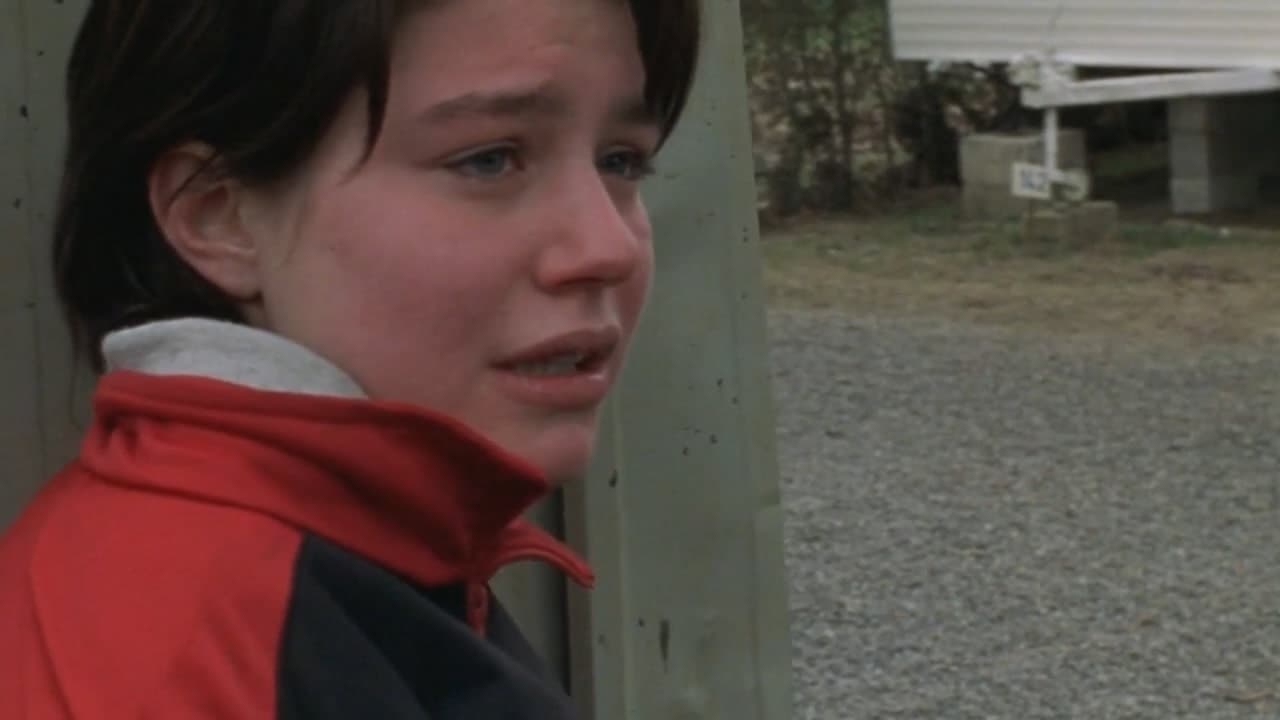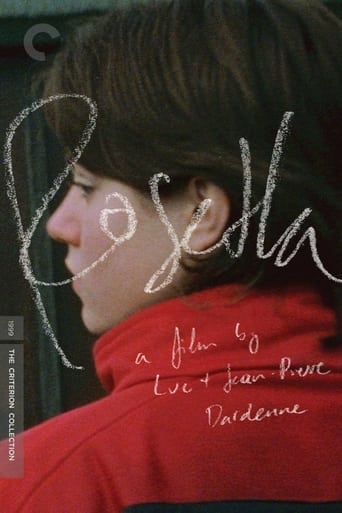LastingAware
The greatest movie ever!
Protraph
Lack of good storyline.
Robert Joyner
The plot isn't so bad, but the pace of storytelling is too slow which makes people bored. Certain moments are so obvious and unnecessary for the main plot. I would've fast-forwarded those moments if it was an online streaming. The ending looks like implying a sequel, not sure if this movie will get one
Ezmae Chang
This is a small, humorous movie in some ways, but it has a huge heart. What a nice experience.
Camoo
Re-watched this film recently out of interest and vague, powerful memories of the lead actress, Emile Dequenne. I was very happy to have revisited it. In the years since seeing it, I have caught up on all the Dardenne brother films, and consider them to be among my favorite directors, observant, gentle, and tuned into a world I personally know very little about. His characters are alien to me - and indeed alienated themselves, though I grew up in Belgium I did not know anybody like Rosetta. The impact of a Dardenne brothers film is very intense, and are often very cathartic. Rosetta is no different. Filmed very sparsely, leaving characters with very little place to hide and ultimately displaying a profound vulnerability. It really belongs among the greatest films.
StarsDown
It really is a shame there is no decent distribution for this film in the US. Rosetta is a film that deserves one. Rosetta is a poor girl fighting against the circumstances of her life. She fights a futile effort to keep a job to make a steady wage to be able to move out of the trailer park where she is stuck with her alcoholic mother. Being a teenager she gets a lower wage and does not get to work a job long enough to get unemployment or has not been unemployed long enough to get hired long term. She wants a normal life so badly but something seems to happen to get in the way. I could not help but draw many parallels to Robert Bresson's film Mouchette which is also about a girl living a tragic life. Unlike Mouchette though Rosetta is trying to do something about it and will fight the world if needed. There is a very touching scene where Rosetta gives herself a pep talk before going to sleep. She has a normal job, a friend and a normal life and she will not falter. Like always though circumstances are working against her.The Dardenne brothers shot this film with hand held cameras and you can tell with the way it moves and sways as it tries to keep up with Rosetta who is constantly moving. It almost seems if she stands still for too long she will be stuck in her impossible situation forever. The Dardenne brothers as always do a great job of shooting the film with natural lighting in long takes often following the character almost if she is an animal in the wild and if they get too close she will run away. All throughout the film Rosetta suffers from sudden and extreme cases of stomach pain. This pain is never given a cause but the amount of different probable reasons that she might have this pain shows just further displays the challenges Rosetta must face. She uses a hair dryer on her stomach to ease the pain and the viewer cannot help but feel that this might just be a replacement for the human warmth Rosetta does not have in her life. Emilie Dequenne gives a subtle yet powerful performance of this woman who is in a desperate struggle against the hand she was dealt in this life.
Graham Greene
Brothers Jean-Pierre and Luc Dardenne concern themselves with creating films that put realism on the screen without using artifice or cinematic trickery to distract the audience from the socially aware message at the core of their narratives. Unlike the similarly themed dogme movement, or the more iconic works of Lars von Trier etc, the Dardenne brothers are unconcerned with changing the face of cinematic reality, but rather, take their cue from people like Ken Loach, Bruno Dumont and Robert Bresson; by creating honest, often-bleak works of film that take their character from despair, to hope, and sometimes, right back to despair, in order to give the audience a taste of a world away from the more comfortable social milieu we might be accustomed to. The concept could be read as hypocritical admittedly, and although the occasional heavy-handed quality of the brother's work does intermittently become preachy, there is ample opportunity to deliver some moments of earth-shattering drama.I first encountered the Dardenne's work back in 2001, when British film channel Film Four premiered their film The Promise (1996) in preparation for the premier of their highly acclaimed follow up film Rosetta (1999). Both films are here are heavily indebted to the naturalistic/realist work of Bresson and Loach, particularly films like Diary of a Country Priest (1951), Riff Raff (1990) and Raining Stones (1993); with the filmmakers presenting the viewer with a series of characters continually forced to the brink of despair, but desperate to pull themselves back.Rosetta was their follow up to The Promise and is the film that garnered the most attention when first shown at the Cannes film festival back in 1999. The film continues the thematic and visual preoccupations familiar from The Promise, though for me is less successful in its overall intent. The film follows the brilliant Emilie Dequenne as a troubled young teenager desperately searching the Belgium ghettos for work, whilst also having to put up with an alcoholic mother, a lecherous landlord and a series of ignorant civil servants. The use of hand-held cameras and jarring jump-cuts is much greater this time around with the brothers seemingly intent on alienating the viewer, but also, expressionistically conveying the lead protagonist's sense of cultural dislocation and alienation from the world around her. It also creates an extraordinary sense of intimacy between the audience and the character and showing the full range of Dequenne nuanced and entirely naturalistic central performance.As with The Promise, the brothers pepper their film with an abundance of topical, moralistic issues such as the passage into adulthood, immigration and domestic abuse, but at the centre of the drama there is still room for hope. Rosetta might not be a ground-breaking film or even the better film of the two that I have seen - its ideas are well worn and its scenarios familiar from the classic kitchen-sink cinema of films like Saturday Night and Sunday Morning (1960) and A Taste of Honey (1961) to name only two - but the process of refinement that the brothers are able to create with the subtle shading of characters and the no-nonsense approach to film-making is really quite affecting on the most personal and emotional of levels.
Buff
Like in Dardenne brothers films, in this one we witness how the main character makes a mistake because of hardships of life or because he/she is naive, then realizes the mistake and corrects it, eventually doing the right thing. No frills, no drama, yet so moving. When we watch this whole process with the kind of fantastic and unconventional closeness - the engrossing & realistic Dardenne-style of close up shots - we actually fall in love and sympathize with the main character - the girl Rosetta. This isn't a sad movie at all (like some people have commented), its a lovely movie that celebrates the spirit of being a normal human being, a must see for any cinema buff. Unlike ambiguous Hollywood films, Dardenne movies are simple and focused, the audience precisely and naturally sees what the directors want to say.

